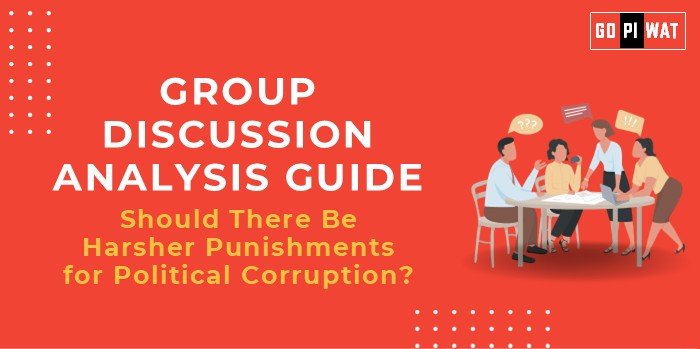📋 Group Discussion (GD) Analysis Guide
🌐 Topic: Should There Be Harsher Punishments for Political Corruption?
🌟 Introduction
Political corruption undermines trust, distorts governance, and inhibits economic development. Calls for harsher punishments often emerge as a solution, but such measures require careful consideration of their implementation and impact.
📊 Quick Facts & Key Statistics
- 🌍 Global Corruption Ranking: Over two-thirds of countries scored below 50 out of 100 in the 2023 Corruption Perceptions Index by Transparency International, signaling pervasive corruption worldwide.
- 💰 Economic Impact: Corruption disrupts markets, deters foreign direct investment, and hampers economic growth.
- ⚖️ Sentencing Guidelines: The U.S. Sentencing Commission’s 2024 Guidelines Manual offers structured frameworks for sentencing corruption-related offenses, highlighting the global shift toward formalized penalties.
🧑🤝🧑 Stakeholders and Their Roles
- 🏛️ Government Bodies: Draft and enforce anti-corruption policies and penalties.
- ⚖️ Judiciary Systems: Ensure impartial trials and proportional sentencing.
- 🌍 International Organizations: Promote transparency through global indices and conventions.
- 📰 Media and Civil Society: Investigate corruption cases and advocate for reforms.
🏆 Achievements and Challenges
🎉 Achievements:
- 📋 Case Study: Brazil’s “Operation Car Wash” unveiled widespread corruption, leading to high-profile convictions and reforms.
- 🌍 Global Efforts: The UN Convention Against Corruption (UNCAC) provides a comprehensive legal framework for combating corruption globally.
⚠️ Challenges:
- 🛠️ Implementation Gaps: Weak enforcement mechanisms in many nations.
- 🏛️ Political Resistance: Corrupt actors often influence legislative processes to dilute anti-corruption measures.
- 🌏 Global Comparisons: Singapore’s zero-tolerance approach shows the potential of combining strong deterrents with governance reforms.
🗣️ Effective Discussion Approaches
📌 Opening Approaches:
- 📉 Start with an impactful fact: “Two-thirds of nations struggle with serious corruption issues, as per the 2023 Corruption Perceptions Index.”
- ❓ Pose a provocative question: “Can harsher penalties alone resolve systemic corruption issues?”
🎭 Counter-Argument Handling:
- Emphasize preventive measures like transparency tools alongside punitive actions.
- Highlight cases where strict penalties deterred corruption effectively.
🔍 Strategic Analysis of Strengths & Weaknesses
- ✅ Strengths:
- Enhanced deterrence.
- Promotion of ethical governance.
- ❌ Weaknesses:
- Risk of misuse.
- Potential for political weaponization.
- 📈 Opportunities:
- Improved foreign investment through a clean governance image.
- ⚠️ Threats:
- Resistance from entrenched corrupt networks.
- Public skepticism.
📖 Structured Arguments for Discussion
- ✅ Supporting Stance: “Harsher punishments are essential to deter corruption and restore institutional credibility.”
- ❌ Opposing Stance: “Overly strict penalties risk misuse and may target political adversaries unjustly.”
- ⚖️ Balanced Perspective: “A dual approach—stricter penalties with systemic reforms—is vital for lasting impact.”
🎓 Connecting with B-School Applications
- 📘 Real-World Applications:
- Explore the intersection of governance quality and business ethics in case studies.
- 📋 Sample Questions:
- “What role do stricter punishments play in improving a country’s investment climate?”
- “How can businesses adapt to environments with high corruption risks?”
- 💡 Insights for B-School Students:
- Examine governance challenges through corporate sustainability and compliance lenses.


